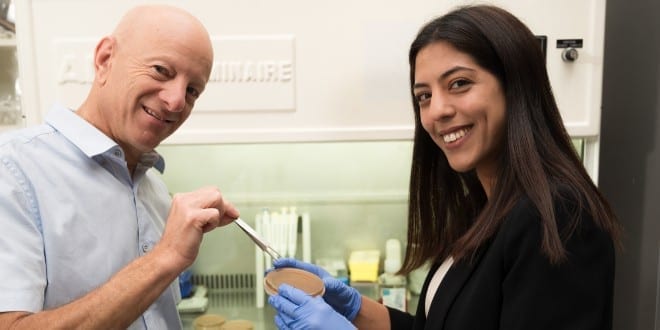With large numbers of bacteria becoming resistant to antibiotics – due to overuse – around the world, doctors fear that in the not-too-distant future, these drugs will no longer be effective against prevalent infections. Hospitals are already trying to cope with this problem on a daily basis.
Aware of this threat and thinking “outside the box,” scientists at Ben-Gurion University (BGU) of the Negev in Beersheba and German and American colleagues have developed a pair of “molecular tweezers” to destroy the biofilm that surrounds and protects virulent bacteria after entering the body. Their findings were published recently in Cell Chemical Biology under the title “Inhibition of Staphylococcus aureus biofilm-forming functional amyloid by molecular tweezers.”
The team, led by Prof. Raz Jelinek of BGU’s chemistry department and his doctoral student Ravit Malishev, tested their molecular tweezers on the Staphylococcus aureus (Staph) bacteria. These infections have an estimated death rate in the US of over 25% and as much as 40% for drug-resistant strains. The researchers developed two specific tweezers that bind and either disrupt biofilm formation or break existing biofilms.
Biofilms, the team wrote, are rigid and largely impenetrable three-dimensional matrices constituting virulence determinants of various pathogenic bacteria. Here, we demonstrate that molecular tweezers, unique supramolecular artificial receptors, modulate biofilm formation of Staphylococcus aureus. Our study points to a possible role for molecular tweezers as potent biofilm inhibitors and antibacterial agents, particularly against untreatable biofilm-forming … bacteria such as methicillin-resistant S. aureus.
“Our discovery prevents infection without building up antibiotic resistance. As such, it might even be preferable to construct treatments based on molecular tweezers rather than antibiotics,” noted Jelinek, who is also BGU’s vice president of research and development and a member of the Ilse Katz Institute for Nanoscale Science and Technology.
“Importantly, binding the tweezers to the biofilm disrupts its protective capabilities. In consequence, the bacterial pathogens become, on the one hand, much less virulent to the human body, and, on the other hand, more vulnerable to elimination by the immune system.”
The shortcode is missing a valid Donation Form ID attribute.



